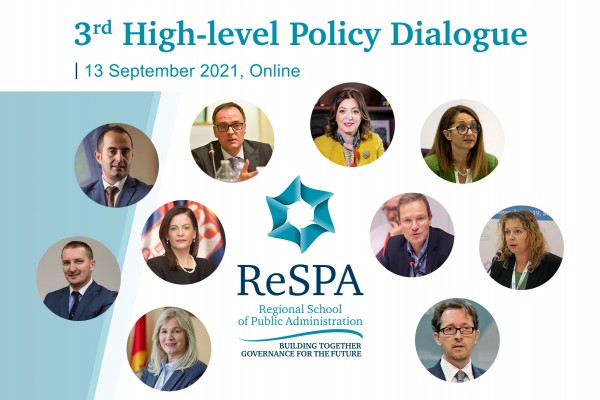
Sekulović: High-level Policy Dialogue remains a unique opportunity for ministers and EC representatives to define strategic direction on PAR in the upcoming year
This year's High-level Policy Dialogue brought together virtually ministers responsible for PAR, the highest EC representatives accountable for the Western Balkans and PAR, and OECD/SIGMA, representatives of EU Delegations from the Region and numerous experts, to discuss the state of play in PAR, common issues and challenges as well as an efficient strategic direction for improvements in the upcoming year.
"ReSPA remains committed to supporting the development of public policies, depoliticization and professionalization of public administration, and improving the quality of public services. With the explicit support of the European Commission and joint efforts with the governments of the Western Balkans, we will continue to support the construction of transparent, responsible and professional public administration institutions in the Region," emphasized Ms Ratka Sekulović, ReSPA Director in her welcoming address.
Ms Sekulović also highlighted the novelties in ReSPA's support to the WB public administration, such as the Regional Quality Management Centre (as the source for improving citizen-centred services), the Regional Network on Policy Coordination (which aims to support improvements in the quality of policy planning processes) and Regional Survey on civil servants satisfaction (a joint initiative with OECD/SIGMA to explore further enhancements in the WB public administrations based on identified issues, needs and expectations of civil servants working in public administrations).
Key achievements and challenges in the process of PAR in ReSPA Members
Ministers in charge of Public Administration discussed various issues and explored modalities for further cooperation with their counterparts and institutions in the Region and broader.
Josip Grubeša, Minister of Justice of Bosnia and Herzegovina, Marina Banović State secretary in Ministry of Public Administration, Digital Society and Media of Montenegro, Jeton Shaqiri, Minister of Information Society and Administration of the Republic of North Macedonia and Marija Obradović, Minister of Public Administration and Local-Self Government of the Republic of Serbia and Chair of the Respa Governing Board at Ministerial level presented the key results achieved in the reform of public administrations within their respective countries. They emphasized the importance of further regional cooperation in all areas of public administration reform primarily through mutual exchange of experiences and knowledge of all actors in PAR. They also jointly underlined their readiness to support ReSPA's efforts to better Western Balkan's public administration.
The work of the WBs public administrations is getting stronger prominence in the accession negotiation process
"The Revised Enlargement Methodology now is being rolled out into the accession process, which means the work of the WBs public administrations is getting even stronger prominence in the accession negotiation process”, said Mr Allan Jones, Head of Unit for Strategy, Policy, EEA/EFTA, DG NEAR. Mr Jones also highlighted that expectations and demands on public administration are above quickly, which needs to reorganize to deliver services for the citizens. "Constant learning is the key to success, and ReSPA is our key partner for this effort – to support constant learning process within WB public administration. European Commission has been a strong supporter of ReSPA since its inception, and we have witnessed the growing ownership of ReSPA Members to build strong relations between the Western Balkan countries” concluded Mr Jones.
Mr Florian Hauser, PAR Team Leader, DG NEAR, said that challenges within public administration reform are quite the same in the Western Balkans and EU countries. The WB counties worked put extreme effort in progressing with the public administration reform. “The well-functioning public administration is crucial now as it will be when the egion enter into EU. The progress in the reform processes is the constant effort for bot, the EU countries as well as the Western Baklans” concluded Mr Hauser.
Presentation of the lesson learned with PAR in IPA II (2014-2020) and programming process of PAR in IPA III (2021-2027)
Ms Gordana Đurović, ReSPA's expert and author of the study "The EU support to Public Administration Reform through the IPA II: an overview and lessons learned" presented the study focusing on the IPA II support to the PAR process in the Region through different implementation models and critical characteristics of selected IPA II programmes per administrations and their lessons learned. Specific focus is given to the direct budget support for PAR activities since it has been a catalyst for institutional changes in most selected programmes and will also be important in the next IPA generation. The critical steps towards the IPA III programming framework were also presented in which readiness of the IPA beneficiaries on PAR remains one of the key performance indicators for further support.
Based on the presented lessons learned, ReSPA intends to support public administration in the Region to better prepare their structures for efficient absorption of the IPA III support, focusing on PAR.



